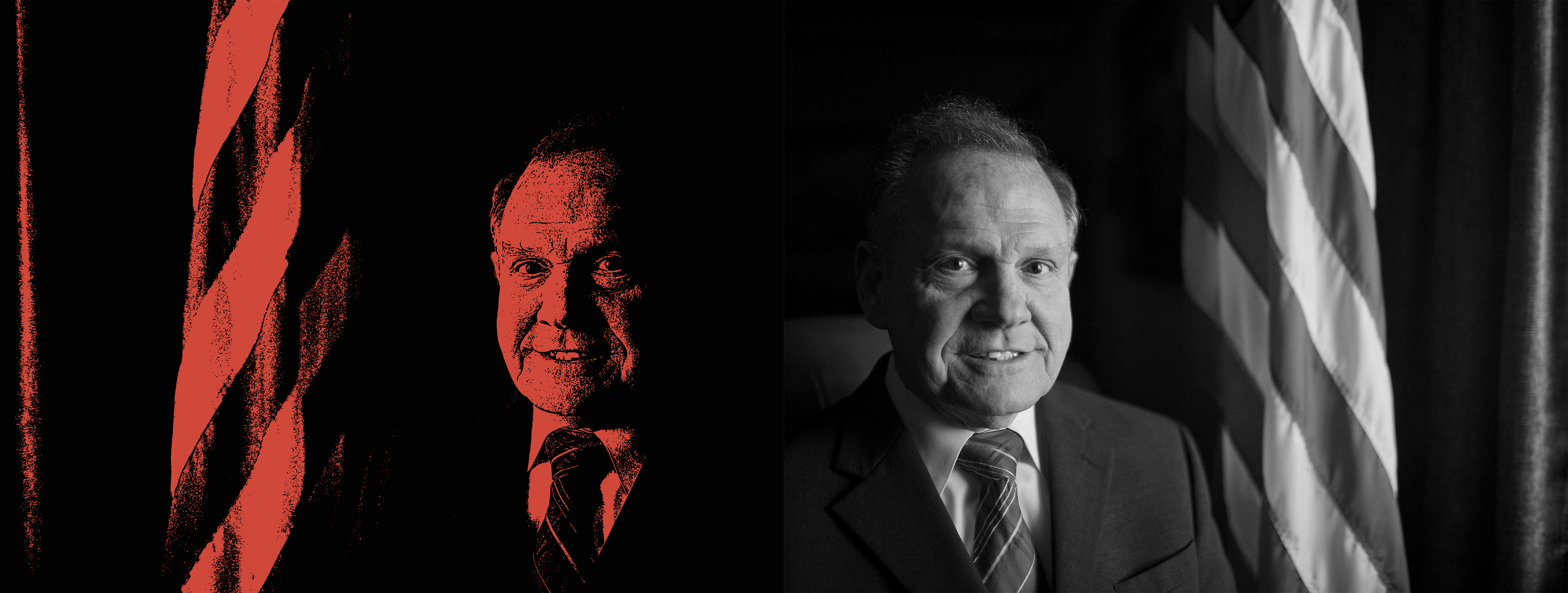Roy Moore and the moral mirror of hatred
If recent history is any indication, we should distrust those who most vehemently peddle hate. Check their closet and you just might find a skeleton.


A free daily email with the biggest news stories of the day – and the best features from TheWeek.com
You are now subscribed
Your newsletter sign-up was successful
Judge Roy Moore, the Republican nominee for the Alabama Senate seat vacated by Jeff Sessions' ascension to attorney general, has long been a purveyor of pietistic hate speech. The self-proclaimed Christian has used racial slurs in public speeches, blamed 9/11 on godlessness, and said that homosexual behavior should be illegal.
But last week, The Washington Post uncovered multiple allegations that Moore had made sexual advances on teenage girls when he was in his 30s. The most egregious accusation involved a girl who claims that Moore groped and kissed her when she was only 14 years old. The Post's bombshell was painstakingly reported, and several friends and family members testify that this accuser disclosed the incident to them years ago. Court records confirm the timeline of her account. (For his part, Moore denies ever engaging in any sexual misconduct.)
Many Americans have expressed shock and dismay at the news that a public figure who presented himself as a model and guardian of Christian morality could have violated those morals in such a profound way. But it must be said: These allegations should sadden everyone but surprise no one.
The Week
Escape your echo chamber. Get the facts behind the news, plus analysis from multiple perspectives.

Sign up for The Week's Free Newsletters
From our morning news briefing to a weekly Good News Newsletter, get the best of The Week delivered directly to your inbox.
From our morning news briefing to a weekly Good News Newsletter, get the best of The Week delivered directly to your inbox.
We've been here before. In the 1980s, televangelist Jim Bakker achieved celebrity status preaching conservative Christian values through his nationally broadcast religious television show. It was later revealed that he had swindled his fans by misappropriating millions of dollars in donations and had paid hush money to his former secretary so she would remain silent about their affair.
After Bakker resigned and was headed for the big house, televangelist Jimmy Swaggart lambasted Bakker as "a cancer on the body of Christ." A year later, Swaggart resigned from his own ministry and admitted that he too had had an affair.
In the early 2000s, evangelical leader Ted Haggard gained notoriety for fighting against LGBT rights and marriage equality. He then admitted a drug-fueled sexual encounter with a male prostitute near his Colorado Springs church. (Interestingly, some studies indicate that homophobia is correlated with the suppression of same-sex attraction.)
After Haggard's fall from grace, mega-church pastor Mark Driscoll insinuated Haggard's wife might be to blame for the downfall because she let herself go and was not "sexually available." Driscoll had risen to prominence as a hipster version of a hellfire-and-damnation preacher with a love for puritan morality. His long list of controversial comments includes a sermon where he shouted to his congregation that "God hates you" because of their sinfulness. In 2014, Driscoll was forced to resign from his church due to a litany of sins including plagiarism, misappropriation of ministry funds, and emotional abuse of church staff.
A free daily email with the biggest news stories of the day – and the best features from TheWeek.com
While these examples serve as cautionary tales for Christian leaders like Moore, they also provide hope for the Senate candidate. All four ministers listed above are now back running churches and ministries just as they once were. So even if allegations against Moore do prove true, it doesn't mean that the heavily Christian voters in Alabama will abandon him. Indeed, a new poll finds that 37 percent of Alabama evangelicals say they are now more likely to vote for Moore given the allegations.
Of course, hypocrisy is neither localized to well-known figures nor unique to the Christian community. No one lives in total consistency with their values, beliefs, and convictions. We are all, in some way and at some point, guilty of hypocrisy.
But the issue at hand is not ultimately hypocrisy; it is the nature of hatred. Certain sectors of America now seem animated by anger and hatred not witnessed in some time. This hatred often emanates from the mouths of religious leaders who use moral language and the authority of the Almighty to afflict others — often marginalized people who are largely powerless to defend themselves.
But if recent history is any indication, we should distrust those who most vehemently peddle hate. Check their closet and you just might find a skeleton.
Research conducted by Jeff Schimel, a psychology professor at the University of Alberta, adds quantitative support for such skepticism. In one study, subjects who showed high levels of anger were more likely to rate others as angry. When participants were told they were dishonest, they were more likely to see others as dishonest. Whenever people come to believe they possess an unacceptable trait, they are more likely to see these traits in others.
Swiss psychiatrist Carl Jung famously said that "everything that irritates us about others can lead us to an understanding of ourselves." For Jungians, every human possesses a "shadow side" that contains all the behaviors they feel are bad or inappropriate. When our moral frameworks lead us to hide these behaviors, rather than deal with them honestly, they can lead to a sense of self-hatred. We try to repress these emotions, but they often escape in the form of anger toward others who we believe are immoral like we are.
These human tendencies can especially afflict pietistic people with constricting ethical frameworks. In his iconic theological treatise, Mere Christianity, C.S. Lewis noted that Christian morals can unconsciously instill in its adherents a sense of pride, which often turns into hypocrisy: "There is a vice of which no man in the world is free; which everyone loathes when he sees it in someone else. ... And the more we have it ourselves, the more we dislike it in others."
In the days ahead, we will likely learn whether Roy Moore is the paragon of Christian virtue he has led us to believe (unlikely!), or if his years of hatred were born out of guilt. We should not be surprised if the latter proves true. For when one uses hatred as a window through which to view others, it often turns out to have been a mirror all along.
Jonathan Merritt is author of the book Learning to Speak God from Scratch: Why Sacred Words are Vanishing — and How We Can Revive Them and a contributing writer for The Atlantic.
-
 Why is the Trump administration talking about ‘Western civilization’?
Why is the Trump administration talking about ‘Western civilization’?Talking Points Rubio says Europe, US bonded by religion and ancestry
-
 Quentin Deranque: a student’s death energizes the French far right
Quentin Deranque: a student’s death energizes the French far rightIN THE SPOTLIGHT Reactions to the violent killing of an ultra-conservative activist offer a glimpse at the culture wars roiling France ahead of next year’s elections.
-
 Secured vs. unsecured loans: how do they differ and which is better?
Secured vs. unsecured loans: how do they differ and which is better?the explainer They are distinguished by the level of risk and the inclusion of collateral
-
 The billionaires’ wealth tax: a catastrophe for California?
The billionaires’ wealth tax: a catastrophe for California?Talking Point Peter Thiel and Larry Page preparing to change state residency
-
 Bari Weiss’ ‘60 Minutes’ scandal is about more than one report
Bari Weiss’ ‘60 Minutes’ scandal is about more than one reportIN THE SPOTLIGHT By blocking an approved segment on a controversial prison holding US deportees in El Salvador, the editor-in-chief of CBS News has become the main story
-
 Has Zohran Mamdani shown the Democrats how to win again?
Has Zohran Mamdani shown the Democrats how to win again?Today’s Big Question New York City mayoral election touted as victory for left-wing populists but moderate centrist wins elsewhere present more complex path for Democratic Party
-
 Millions turn out for anti-Trump ‘No Kings’ rallies
Millions turn out for anti-Trump ‘No Kings’ ralliesSpeed Read An estimated 7 million people participated, 2 million more than at the first ‘No Kings’ protest in June
-
 Ghislaine Maxwell: angling for a Trump pardon
Ghislaine Maxwell: angling for a Trump pardonTalking Point Convicted sex trafficker's testimony could shed new light on president's links to Jeffrey Epstein
-
 The last words and final moments of 40 presidents
The last words and final moments of 40 presidentsThe Explainer Some are eloquent quotes worthy of the holders of the highest office in the nation, and others... aren't
-
 The JFK files: the truth at last?
The JFK files: the truth at last?In The Spotlight More than 64,000 previously classified documents relating the 1963 assassination of John F. Kennedy have been released by the Trump administration
-
 'Seriously, not literally': how should the world take Donald Trump?
'Seriously, not literally': how should the world take Donald Trump?Today's big question White House rhetoric and reality look likely to become increasingly blurred
